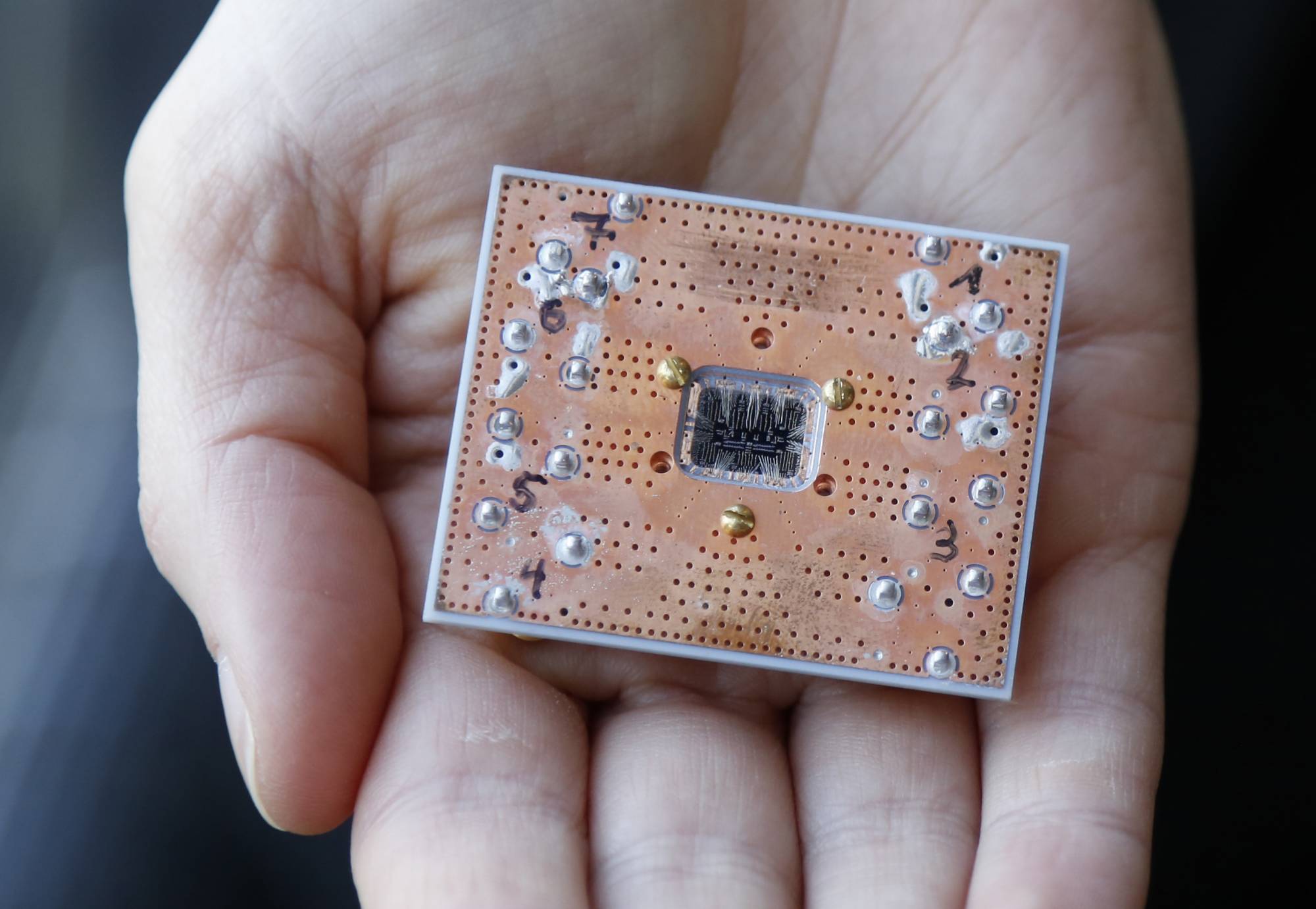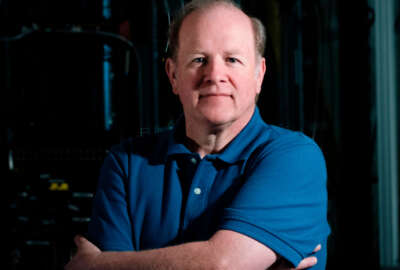Retired CIA deputy for S&T finds new private sector role in quantum computing
Dawn Meyerriecks retired last year as the deputy director of the CIA for science and technology. She served before that at NASA's Jet Propulsion Laboratory, the...
Best listening experience is on Chrome, Firefox or Safari. Subscribe to Federal Drive’s daily audio interviews on Apple Podcasts or PodcastOne.
A new private sector role for a long time federal technology executive. Dawn Meyerriecks retired last year as the deputy director of the CIA for science and technology. She served before that at NASA’s Jet Propulsion Laboratory, the Office of the Director of National Intelligence, and the Defense Information Systems Agency. She has now been appointed a member of the board of directors at ColdQuanta, She talked with Federal News Network’s Jared Serbu on the Federal Drive with Tom Temin about the new role and how it dovetails with her long experience in federal government.
Interview transcript:
Dawn Meyerriecks: So I retired from federal service at the end of last year. And one of the people that I spent a lot of time with inside also joined this corporation and brought it to my attention. And I had sponsored some early research at IARPA on quantum but I was a quantum skeptic. That it was going to take a long time to actually have something that was production quality that made a difference. And she really encouraged me to talk to her tech team. And what I think is so interesting about ColdQuanta and the leadership team that they put together there as they have very pragmatic approach to get to quantum computing. And along the way, they’re going to focus on things like precision clocks and inertial navigation, because those two things come in pairs and quantum sensors. So it was the first time that I saw an actual business plan that married up what was possible with the tech with a long-term vision that I think is achievable, because those are proving stops along the way. So I told Scott, they turned me from a skeptic into a believer in the business case. And so it was a great pleasure to be added to their team, because we need it. We need it across the board. And here’s an opportunity for me to put my money where my mouth is, and actually help make that happen.
Jared Serbu: That’s super interesting. Say a little bit more about what you mean by pragmatic, what are the pragmatic and non-pragmatic ways to approach quantum at this period in time?
Dawn Meyerriecks: Well, I think, you know, one of the things the federal government is really good at is taking long-term views for returns on research and development early on. So basic research and development. And so the work that we were doing at IARPA and other places was really focused on the long-term game plan. And I think that’s great. And it underpins a lot of great science. But I also think there are a lot of interim steps that you can take, and the fact that we’re using, in this case, other people’s money, investor’s money and coming up with a very pragmatic. Here’s some things that we’ve got to work out like precision clock, which then lends itself to inertial navigation, which lends itself to the next step of quantum sensors. Because I think the pragmatic use that I really like about what I’m seeing here, from the approach that the company is taking. It’s not a 20 years, and maybe we’ll have something. It’s a there are proving grounds that we can take step by step by step, and also generate some revenue and work out the kinks. And continue to make progress against the vision and goal that I think is the big idea and the big game changer.
Jared Serbu: So what do you think your long federal service brings to the table as a board member to help with all these efforts?
Dawn Meyerriecks: So my reputation was always being the one who asked the questions that made people uncomfortable. And, it wasn’t about the tech generally. Because I mean, let’s be honest, as a senior in the government, you don’t want me making complex technical calls, right? That’s not my job anymore. But my job really is to ask questions about how’s the team doing? How are the stakeholders? Can we articulate a business case that makes sense on a timeline that people can buy into. I was really asking those kinds of questions, and I loved it because I would have world experts explaining the tech to me, but I would also then put them through their paces on the okay, show me what are the interim deliverables? How do I know that we’re making progress? And how are your stakeholders? All of those sorts of things that I think are absolutely perhaps more important than the tech itself. Which so often gets overlooked.
Jared Serbu: Yeah, and I wanted to ask you specifically about your last government role at CIA leading S&T directorate, I know, there’s specific technologies, probably other things that you definitely can’t talk about. But in that job, specifically, what work are you proudest of?
Dawn Meyerriecks: Yeah, thanks for that question. I love that team, I still work with that team from a leadership perspective. So you know, the fact that In-Q-Tel went international with UK and Australia I’m really proud of. We got CIA labs launched so that the govies can file and hold patents. We actually came up with a program to recognize government expertise and reward that. Then we also did a lot of work to put DS&T officers much more closely integrated into operations and analysis and we saw immediate gains from that. So those are the kinds of things that I can talk about. And then just because I know this community that you talk to. DS&T is known for operating in all domains and all phenomenology, land, airspace, maritime, and support to human operations. That’s, that’s the key piece. And I’ll just let historical examples and invite your readers to imagine so if you think about the SR 71. The first photo satellites, dragonfly copters, dead drop rats, disguises and Argo, you’re in the ballpark of the kinds of things that the the DS&T is still doing from a technology perspective. It really is the most amazing organization I’ve ever had the privilege to be a part of.
Jared Serbu: Interesting. Before we let you go, I want to actually loop all the way back to quantum. Because it’s all sci-fi to me to be completely honest. You said we really need it. Describe a little bit more what why it’s so interesting and why we need it.
Dawn Meyerriecks: I think the sky is falling thing that everybody gets engaged in is the fact that quantum net production would actually make cracking public key cryptography trivial. And because we’ve got that pretty much permeated through our infrastructure. Back in the day, I was part of that first enterprise license for Netscape’s PKI certificate servers. So I feel kind of responsible to make sure that I don’t just leave everybody in the lurch on that. But beyond that, there’s a whole set of problems that right now take literally days, hours, weeks to compute. Fluid dynamics, what if we could process radar, as it came off at the collectors at speed? There’s just these marvelous problems. If we could do detection, because radars are day, night, all weather. If we could do detection, object identification, at the speed at which the radar processor is collecting that data, you have a whole bunch more options, if you’re trying to play either offense or defense. So there’s this class of problems that just lends itself at full production, that would, again, change the way we think about offense and defense.
Jared Serbu: How does it help on the defense side? Does getting to quantum first also solve some of the cryptography problems? That’s what I don’t fully have my head around, I think.
Dawn Meyerriecks: So I think in that case, you can actually start to estimate how long it will take for some some things to be. I mean, if nothing else, it gives us visibility to how either hard or trivial it is for implementations that we’ve done in place. But I think this is part of what I see is that when we can figure out how to actually do quantum sensors at scale, which isn’t the compute piece yet, but is the sensor piece. Now that helps you with defense, you get more indications and warnings, you get more time to take action. Those kinds of things are what I think about in terms of how it helps the defense.
Jared Serbu: That’s Dawn Meyerriecks, former CIA Deputy Director for science and technology, now a board member at ColdQuanta.
Copyright © 2025 Federal News Network. All rights reserved. This website is not intended for users located within the European Economic Area.
Jared Serbu is deputy editor of Federal News Network and reports on the Defense Department’s contracting, legislative, workforce and IT issues.
Follow @jserbuWFED





